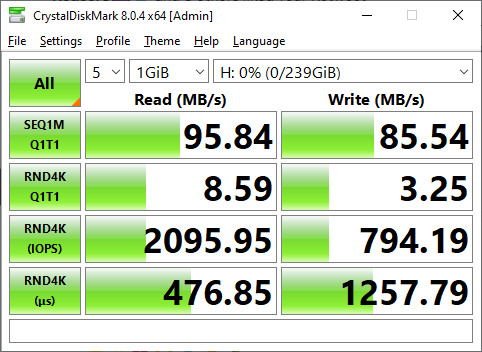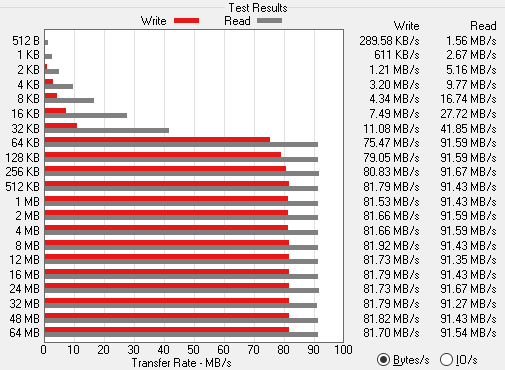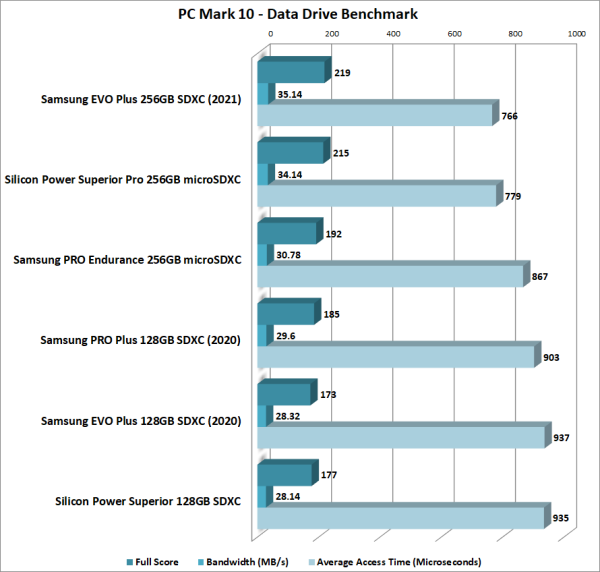Performance:
The test system used in this review is equipped with an AMD Ryzen 7 3700x CPU, MSI B550 GAMING PLUS motherboard, 16GB (8GB x 2) of Crucial Ballistix 3200 MHz DDR4 memory, Crucial P5 1TB SSD, GIGABYTE GeForce GTX 1060 WINDFORCE OC 6G graphics card and a Lexar Multi-Card 2-in-1 USB 3.1 card reader. For the operating system, I used the latest version of Windows 10 Pro.
To test the performance of Samsung's PRO Endurance microSDXC card, I ran a series of benchmarks using CrystalDiskMark, ATTO Disk Benchmark and PCMark 10. To get a feel for the "real world" performance, I also copied and pasted 1GB of random files and directories as well as a single 4GB ISO file in Windows Explorer.
CrystalDiskMark 8.0.4:
First, I ran a few quick tests using CrystalDiskMark. This benchmark measures the performance of a storage device by testing its sequential and random read and write speeds.
According to Samsung, the 256GB version of their PRO Endurance microSDXC card is capable of reading at 100 MB/s and writing at 40 MB/s. While the card exceeded its rated write speed by a considerable margin, it came up a bit short in CrystalDiskMark's sequential read speed test.
ATTO Disk Benchmark 4.01:
I also used ATTO Disk Benchmark to test the PRO Endurance microSDXC card's sequential read and write speeds. The tests are run using blocks ranging in size from 512B to 64 MB and the total length set to 256MB.
When tested with ATTO, the PRO Endurance microSDXC card's read speeds topped out at about 91.67 MB/s and its write speeds at 81.92 MB/s.
PCMark 10 - Data Drive Benchmark:
PCMark 10's Data Drive Benchmark is designed to test drives that are used for storing files rather than applications. You can also use this test with NAS drives, USB sticks, memory cards, and other external storage devices. This benchmark produces an overall score as a measure of drive performance. Comparing devices is as simple as comparing scores. The tests also measure and report the bandwidth and average access time for the drive.
"Real World" Benchmark:
To test the "real world" performance of Samsung's EVO Plus SD memory card, I copied and pasted 1GB worth of randomly generated files and directories. All of the files are between 1KB and 95MB in size and no more than five directories deep. To see how well the cards handled large files, I also copied and pasted a 4GB ISO file.
| Samsung PRO Endurance 256GB microSDXC (2022) | Samsung EVO Plus 256GB SDXC (2021) | |
| 1GB Files - Write: | 24 seconds | 20 seconds |
| 1GB Files - Read: | 15 seconds | 12 seconds |
| 4GB ISO File - Write: | 52 seconds | 38 seconds |
| 4GB ISO File - Read: | 45 seconds | 33 seconds |
Samsung's new card performed fairly well here, taking 24 seconds to write 1GB worth of test data and 15 seconds to read it back.
Final Thoughts:
Samsung's new PRO Endurance microSD card is an excellent choice for anyone requiring high-endurance storage for use in surveillance cameras, dashboard cameras, doorbell cameras or body cameras. Built with company’s highly reliable enterprise-grade NAND flash, the PRO Endurance card delivers up to 16 years (140,160 hours) of continuous video recording. The card also features Samsung's six-proof durability. In addition to protection against water, magnets, X-rays and extreme temperatures, this new version of the card is both wear out and drop-proof. Performance-wise, the PRO Endurance isn't quite as fast as some of the speed-focused cards. Nevertheless, it is Class 10 rated and is more than capable of recording and playing back video in 4K and Full HD.
Samsung's PRO Endurance microSD card is available now in 32GB, 64GB, 128GB and 256GB capacities. Prices on Amazon.com currently range from $11 up to $38 for the 256GB version reviewed here.




